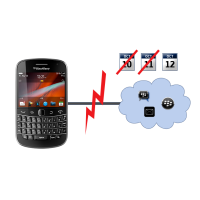For Blackberry this has been an embarrassing couple of hours, even without proper communication which made many Blackberry followers grumpy and upset. We all understand that technology and platforms do run with enormous restrains and expectations. Blackberry and all its 3rd party partners surely has been monitoring reports and resources needed to run an effective platform to ensure that time outs don’t happen, well at least not this long.
As a great Blackberry fan it concerns me as we are encountering more and more of these “outages” which tell me that not enough planning and development is been implemented to avoid such situations. This is very concerning as I am aware of many businesses that have become so depended on Blackberry’s to run their businesses, and when Blackberry is down, your business is down. BBC has reported the following article, Blackberry goes missing, which gave some insight as to how Blackberry & RIM (Research in Motion) handled this issue.
Blackberry’s message goes missing
For the makers of the device whose name became synonymous with messaging, it was a deeply embarrassing 36 hours.
Untold numbers of Blackberry users, first in Europe then in much of the rest of the world, found that their email either slowed or ground to a halt and the BBM service became unavailable.
Worse, the whole incident turned into a business school case study of how not to communicate with your customers – Blackberry simply failed to get its message out. When the problems started to emerge around lunchtime on Monday, social networks were quickly populated with angry and confused customers.
Customers who turned to their mobile phone networks for advice were all directed back to Research in Motion, the Canadian company behind Blackberry. After some hours, RIM used one of its Twitter accounts @Blackberryhelp to send out this tweet:“Some users in EMEA are experiencing issues. We’re investigating, and we apologize for any inconvenience.”
EMEA? Where on earth is that? I know, because marketing speak floods my inbox every minute, that it stands for Europe, the Middle East and Africa, but many people will surely have been mystified.
Of course, journalists were bombarding the Blackberry PR team with calls, demanding to know what was going on, how many people were affected, and what was the root cause. By Monday evening, we had nothing more than the brief line already seen on Twitter.
BBC Radio 1 Newsbeat listeners described how the crash affected them
At a technology awards event in London, reporters spotted a gaggle of RIM PR people clustered around their Blackberries – they promised us more news imminently. And at 21:00 this arrived in our inboxes:
“Earlier today, some BlackBerry subscribers in the EMEA region experienced delays with BlackBerry services. The issue was resolved and services are operating normally. We apologize to those customers who were impacted for any inconvenience.”
No information then about the extent of the problem or what had caused it, but reassurance that it was all over now, please move along, nothing to see here.
Then late on Tuesday morning, I started getting messages from Blackberry users that the problems had returned – emails weren’t arriving, and BBM had ground to a halt again. Worse, it then emerged that users in other parts of the world were now suffering the same experience.
A one-day shutdown might just about be forgiven – especially when the company tells you it has all been sorted. But when it returns on a second day, and there’s still no explanation you are trying customers’ patience with your product to the limit.
Finally, at 21:53 on Tuesday evening, this arrived from RIM:
“RIM update: The messaging and browsing delays being experienced by BlackBerry users in Europe, the Middle East, Africa, India, Brazil, Chile and Argentina were caused by a core switch failure within RIM’s infrastructure. Although the system is designed to failover to a back-up switch, the failover did not function as previously tested. As a result, a large backlog of data was generated and we are now working to clear that backlog and restore normal service as quickly as possible. We apologize for any inconvenience and we will continue to keep you informed.”
In other words, a pretty serious failure had occurred in the infrastructure on which the whole Blackberry ecosystem depends. This morning, a new statement tells us that the issue has finally been resolved.
But it took 36 hours for RIM to give the world any explanation of what had happened – and as far as I know the company still has not put anyone up for interview. I’m hearing that some PR executives argued for more openness from the start but were over-ruled by headquarters in Canada.
This strategy – say as little as possible, ruthlessly control the message from the centre – is similar to the one adopted with such success by Apple over the years. But when things go wrong, it looks like a textbook example of how to lose friends and alienate people.



You must be logged in to post a comment.